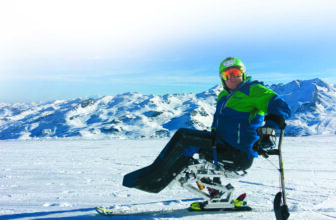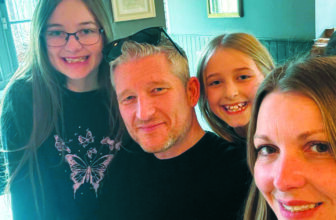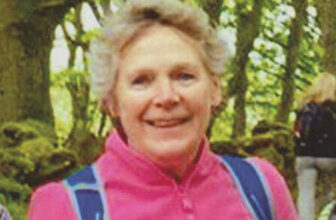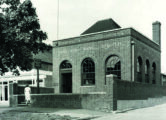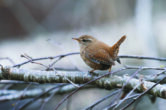
I’ve lived in Cranleigh for nearly twenty-one years now and work as a professional singer, singing teacher, vocal and performance coach, I run the Cranleigh Community Choir (which is just entering its fourteenth year) and I’m the Artist Manager for Eleanore & the Lost. For a very long time I’ve also been doing voluntary (and some paid) work to educate people about sustainable living, and am currently training to become an accredited Climate Change Teacher. I’m really grateful to you for giving me an opportunity to talk about this at such a crucial time.
I was born in 1956 in a little village in Wales called Sully. We lived a five minute walk from the beach, so I spent a lot of time there rock pooling, paddling, and when I wasn’t doing that I was climbing trees and hunting for the supposed secret passage that led from the ruined lime kiln out to Sully Island! You could walk out to the island at low tide and it had a Roman encampment on it, so it was very exciting for a child. There were fields, woods, and the farmer used to let us ride back on the haywain after we’d helped him load the bales of hay.
Our house backed onto woods which were frequented by archaeologists excavating the ruins of the Norman Sully Castle and the other thing of note was that we lived next door to two elderly sisters, one of whom was the widow of Henry Preece (Marconi transmitted the first radio signal across open sea between Lavernock Point at the far end of Sully, and Flat Holm Island in the Bristol Channel). My childhood was idyllic and felt much like living in an Enid Blyton novel! It also instilled in me a deep love for and affinity with the natural world; I felt a part of it, not separate from it.
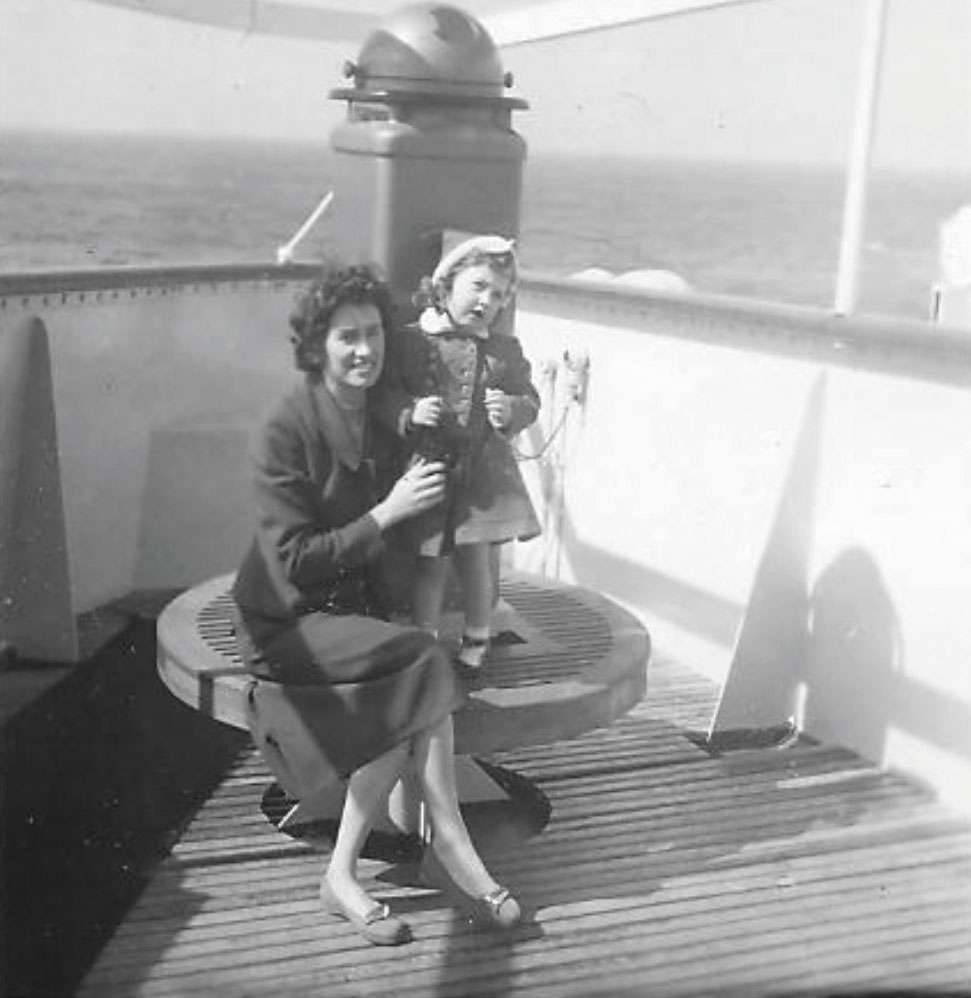
Mummy and me on my Father’s ship
As I was very musical and good at Art too, in Wales you were encouraged enormously and entered into the school, then county and national Eisteddfods – everything musical was in Welsh. The whole culture was very focused on the Arts, so it was a wonderfully creative environment for me with the result that by the time I reached fourteen (we moved up to Surrey when I was thirteen) I’d been writing poetry and music for some time about nature and over-population. I was also lucky enough during my teens to become friends with a girl whose mother had taught her all about wild flowers and trees, so she taught me and to this day it’s something that I continue to extend my knowledge about.
By fifteen, as well as school, I was working semi-professionally as a singer/songwriter. I even had a couple of residencies, performed at functions, entered talent competitions – I was quite driven on the music front. Unfortunately, my parents weren’t keen on my being a musician (probably because of my grandmother who had been a pianist in the silent movies as well as a psychic medium, so I think they were worried I’d be like her – which I probably am!) Consequently, I went to train as a teacher in Bath and stayed there for five years. I loved Bath and also met my daughter Eleanore’s dad there. I loved the West Country and still feel very at home there, especially in Dorset.
In my second year, we had to study William Blake, the poet and artist. He wrote about the spirituality of the natural world which had a huge impact on me, so when I also came across The Gaia hypothesis not long after, it joined some dots for me (The Gaia principle proposes that living organisms interact with their inorganic surroundings on Earth to form a synergistic and self-regulating, complex system that helps to maintain and perpetuate the conditions for life on this planet – reference Wikipedia). It made a lot of sense to me and looking back, how true this has proven to be.
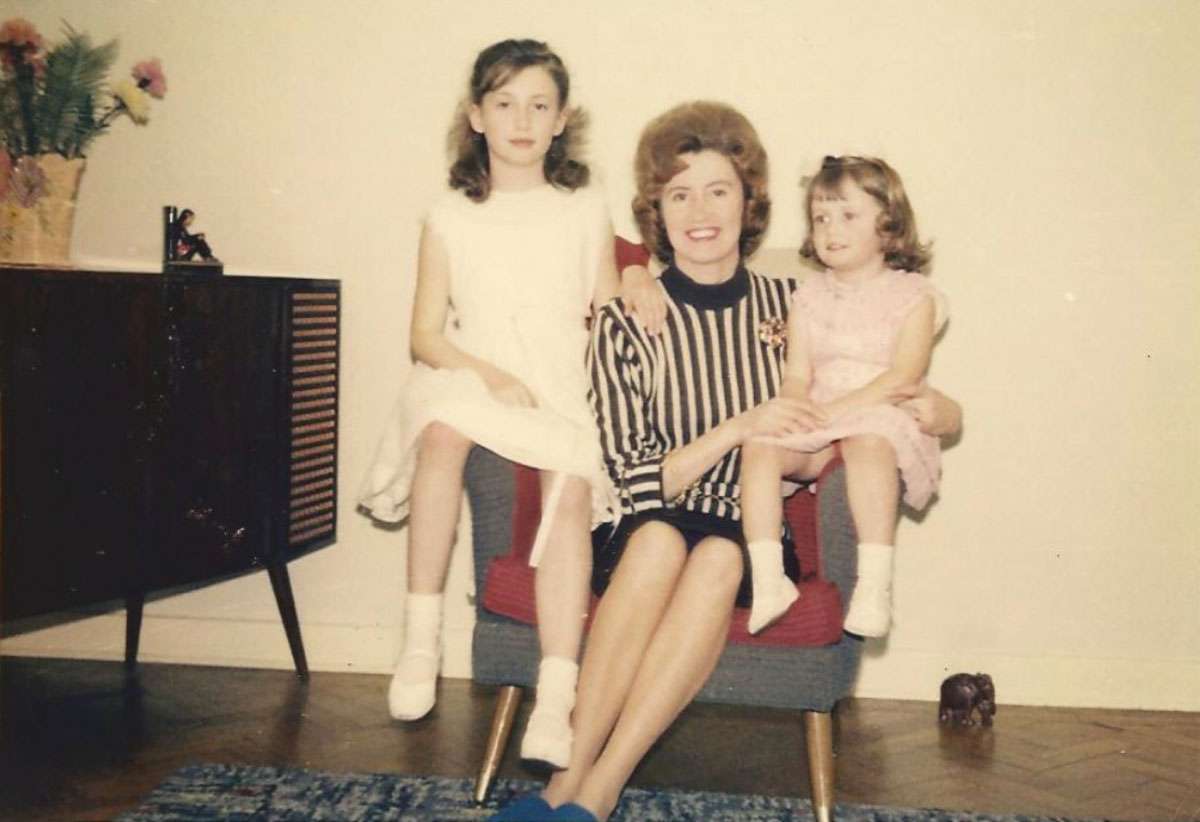
Left to right, me, Mummy and my sister Cherry
It was also in the 1970s I first started finding talk of economic growth somewhat bewildering because it didn’t seem to consider that this couldn’t be infinite in a world with finite resources – a view that now even Mark Carney, Governor of the Bank of England has been talking about recently as he’s soon to go to a job with the United Nations as their Finance Adviser on Climate Change.
All of this was leading me in a particular direction of course and the first big change I made in my personal life was to become a vegetarian in October 1979. In those days it was laughed at so it wasn’t exactly easy, however, for me, being an ethical consumer was and remains an integral part of being green. I had just moved to London to pursue a career in music but was lucky that Cranks Wholefoods had a shop just behind Liberty’s. I felt very strongly about animal welfare, not just in terms of what I was eating but also what products I was using. It was much more difficult at this time to find products that weren’t tested on animals but even then we had the Body Shop, plus Yardley and Innoxa didn’t test their cosmetics on animals. By 1981, I was using eco-friendly household cleaning products and had started making some of my own face creams.
As time went on with my music career, I was singing in a number of bands, finally having my own band playing my original music as well as working as a session singer at Abbey Road Studios. It was all going well and I was just being signed for a deal when I found out that I was having my daughter. It wasn’t an easy decision given the timing, but as I was going to be a single parent, I realised that it was too risky for me to continue with music at this time. I had no family in London so I chose to give it up temporarily and got a job at the University of London. It was very hard physically as I was working full-time with a small baby and no car but it was also wonderful having this gorgeous little person in my life!
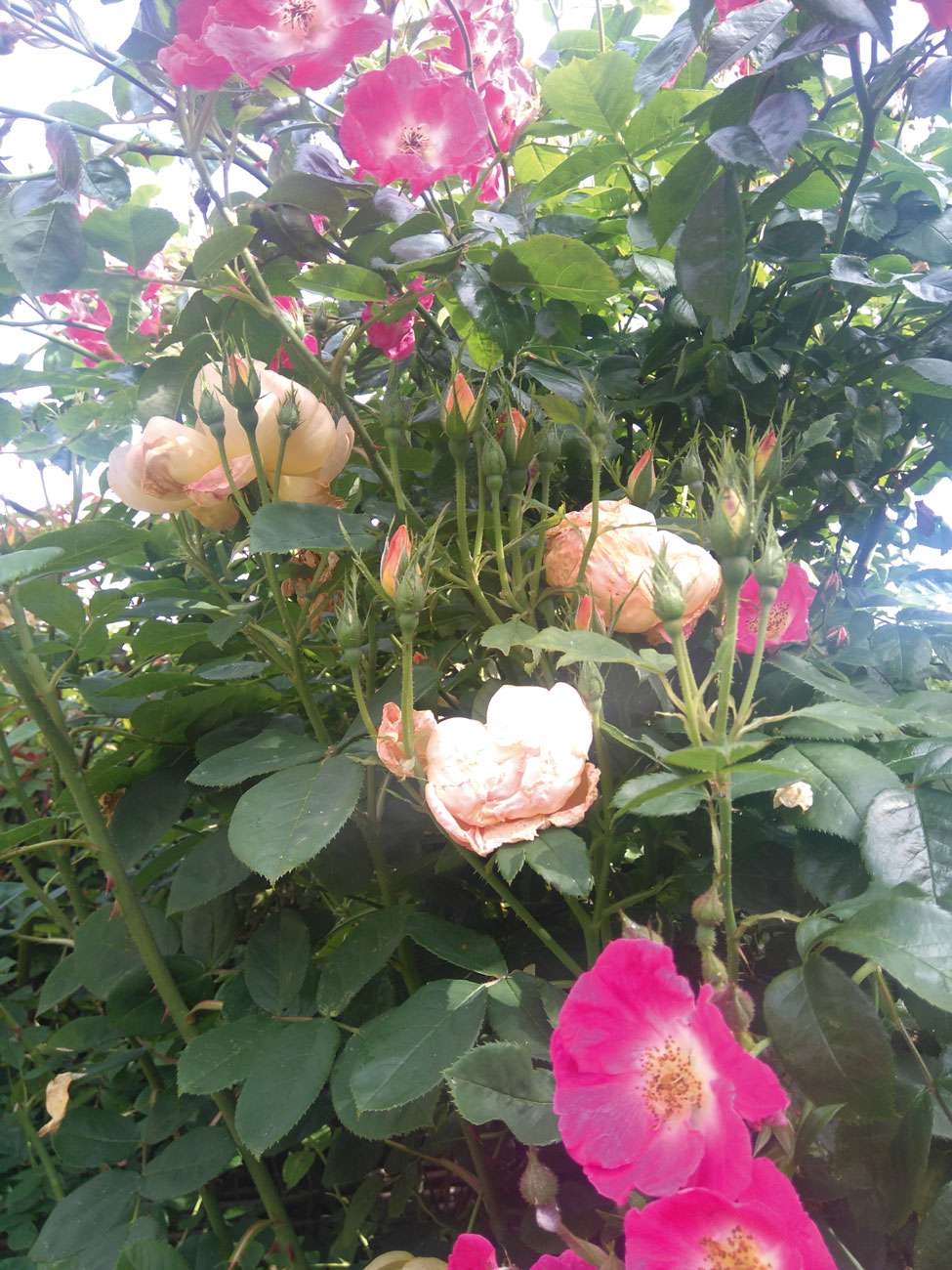
Roses from my organic garden
Eventually we moved to Guildford so that I could be closer to my parents for support. I continued commuting to my job in London for a year (which nearly killed me with a two year old) but then gave up without another job to go to. At least I’d learned to type so I temped for a bit which got us through and of course I had some help now.
We ate organically, I had been using henna vegetable dye on my hair since my mid-twenties (and still do – I’ve learned over the years how to mix the colours to get really natural looking ones), using lots of eco-friendly products, I’d been upcycling furniture since my early twenties, had loved vintage stuff since my early teens and frequenting what were then called “junk” shops. I’d always re-invented clothes I’d got tired of or given them to friends and family, rather than just throwing them away so I suppose we were living a pretty green life compared to most. I’d also started gardening organically whilst in Guildford on the communal gardens I shared.
It was important to me that my little girl was instilled with values that were important: appreciating the real world (the natural world), understanding that “things” didn’t make you happy in the long term, understanding that other animals as well as us were all in a symbiotic relationship with the planet. I bought most of Eleanore’s clothes from car boot sales (I got some absolutely fantastic stuff there over the years). In fact, I can’t really remember what new stuff I bought (and my parents were pretty wealthy so I wasn’t doing this because new stuff wasn’t on offer). I just thought it was better to re-use stuff; I’m sure that a lot of parents do this.
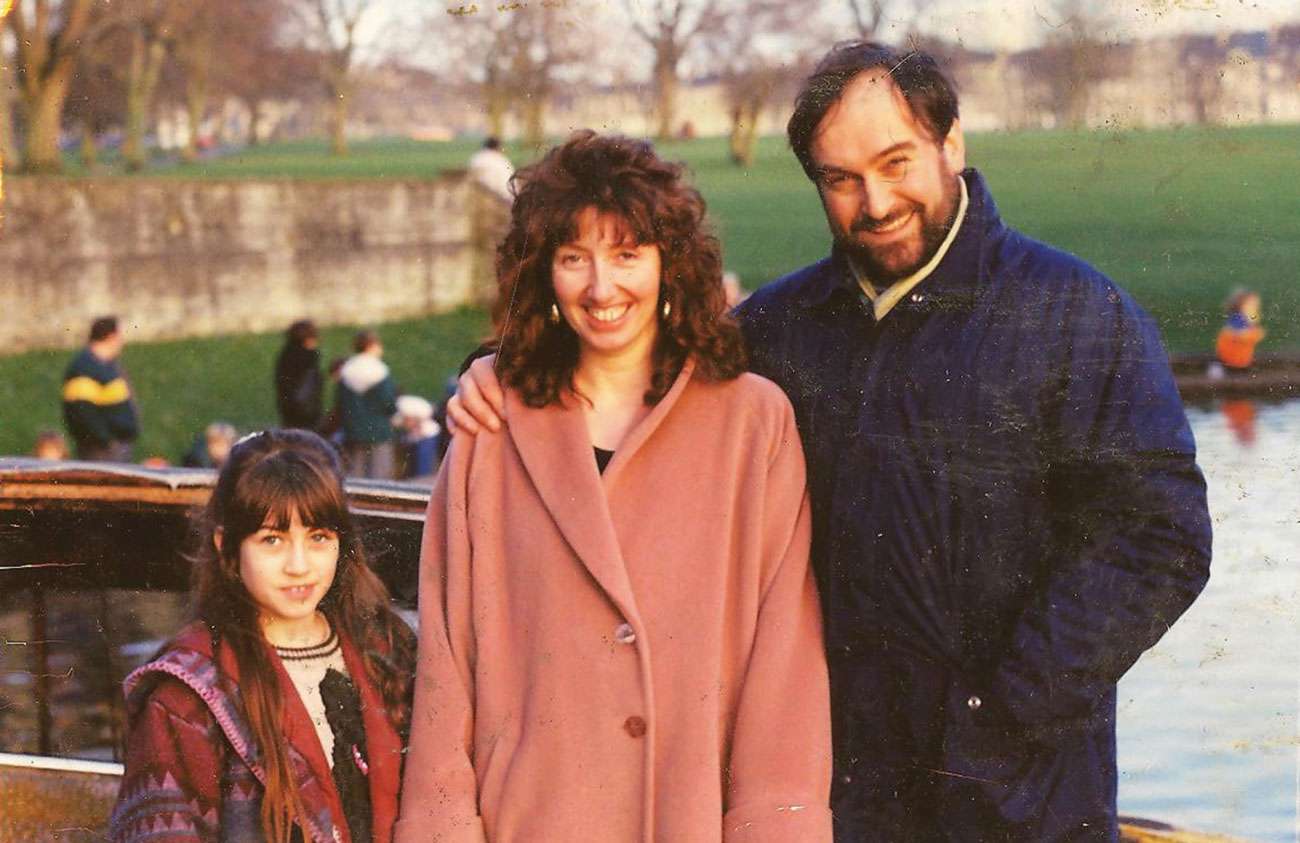
Left to right, Eleanore my daughter, me and her Dad in Bath 1993
During my time out of music, I undertook a formal classical/operatic singing training. I also trained as a psychotherapist and then as a hypnotherapist (I did my therapeutic work part-time for seven years in private practice) and practised as well as my job in the NHS – and somehow I worked my way up to being a senior manager. I remember sitting in meetings wondering what on earth had gone wrong, feeling like a fish out of water! Don’t get me wrong, the NHS is a wonderful institution and it was very good to me; it just wasn’t me.
In 1999, I sold our flat in Guildford and we moved to Cranleigh. It was a big leap in the dark in many ways as I bought the house in June 1999 and for the second time in my life, I gave up my job in the September, again without another one to go to as I felt that I had to get back to being a musician. My daughter was at Guildford High School (an independent school, but her dad was paying the fees) so looking back it was a very bold, reckless move and although I was terrified, I was very determined too. Luckily, it wasn’t long before I managed to get a part-time job teaching singing at the Academy of Contemporary Music (ACM) in Guildford as well as being the singing tutor at Cranleigh Arts Centre. I also got another part-time job whilst I built up my music career again. It only took me two years to be able to leave both PAYE jobs and go completely freelance.
Moving to Cranleigh enabled me to get stuck in with voluntary work, so initially I compiled, printed out and delivered a questionnaire to the whole of the estate where I live, to find out what the level of environmental awareness was (I got a good response). Through this, Waverley Borough Council became interested in me and asked if I’d be willing to help them manning stands at village and school fetes trying to help people think about green issues like not using plastic bags for shopping, like thinking about having a composter in their garden and so on.

Waverley also asked me to help with the set-up of a sister website they were building on environmental issues and I undertook a number of case studies for them: everything from a local carpet cleaning company that only used environmentally-friendly products, the local wholefood shop in Cranleigh (The Natural Life Shop), to an organic farm (Lee House Farm, which still sells produce at our local market as well as selling truly organic, free range eggs also available from The Natural Life Shop.
In about 2003/5, the environmental charity The Worldwide Fund for Nature (WWF-UK) commissioned me to write a number of paid articles on various aspects of sustainable living; they also paid me to edit some of their many books on educating for sustainable development. It was very enjoyable doing the research for the articles and writing them as I really enjoy writing.
Things started to happen after this and I soon became County Sound Radio’s “Green Guru”, where I had a monthly slot on their programme “Ladies First”. Basically, I’d talk about something to do with becoming greener and then members of the public would ring in to ask me questions. It was great fun but unfortunately, County Sound was shelved as a station when Eagle Radio went digital. I was also invited by the Surrey Advertiser to write an eco-blog on their digital “Get Surrey” as well as being invited to lead on a green initiative by the Cranleigh Initiative (unfortunately, the Cranleigh Initiative itself seemed to fizzle out, so that sadly didn’t happen).

What we choose to eat is of great importance
I’ve never been one to preach at people and over the years I’d been asked by so many what I used on my face, what I ate, how I managed to afford to eat organically, what I used in the garden, what paint I used in the house and so on, so I realised there was a need to set up a project on sustainable living. I spoke to my contact at WBC who was very supportive and soon after I was invited along to meet with WWF again to discuss my project, which they offered to monitor and evaluate for me as they were interested in what I was doing. I ran the project over two years from 2006-8 with ten volunteer families from Cranleigh and its surrounding villages. WWF were very generous as they paid for a minibus which enabled us to visit a passively heated house down in Brighton and a biodynamic farming College in Forest Row, East Sussex. Most of the workshops I was able to run from home or at Sayers Croft in Ewhurst. I did it all on a voluntary basis and covered everything from mainstream cleaning products and what chemicals they contained, eco-friendly alternatives and home-made alternatives, energy, water use, home-made and natural beauty products, helping people to understand the basics of how to identify if something was green or not, diet and so on.
At around this time, I’d stopped shopping in supermarkets (which I managed for over seven years). I had to return eventually but I’ve been a loyal customer of The Natural Life Shop in Cranleigh (our local wholefood shop) since I moved to Cranleigh and still buy a lot of stuff in there.
I’ve also been a customer of Riverford Organic for the past twenty years (our local farm is only in Hampshire so the veg don’t travel very far) and I’ve now finally got an allotment so hope to get lots of veg from there from next year. Between the wholefood shop and the vegetables, I suppose I don’t need to buy too much in the supermarket. Even so, I’d like to try to return to avoiding them at some point.

Solar energy is growing fast
As it is, I make my own bread, all my food from scratch (which is so cheap and of course you know exactly what’s in it) and I don’t waste any food. Because I don’t eat meat, it’s easy to afford organic food as much as possible. I make my own soap, my own chocolate, household cleaning products, some beauty products and toiletries – you name it really. I plan my meals and make up batches which go into the freezer – it’s of course very economical. I also only buy recycled paper products like toilet roll, printer paper etc. I never bought into the plastic water bottle and throwaway cup addiction anyway. I suppose I was already too aware that this wasn’t a good idea and anyway, I’ve always loved taking a packed lunch and a flask of tea if I’m going to be out for the day!
In 2008, Ethical Consumer magazine featured our low carbon lifestyle which was quite a big thing for us, but of course the fact that I’d chosen to stop flying in 1990 because of the planet, had been vegetarian since 1979 and dairy free since 1999 made a huge impact on our carbon footprint. In addition to this, from 2007, I’d switched our electricity provider to what was then the only 100% renewable electricity provider in the country, Good Energy (I switched my gas supply to them in 2016 as they’re now investing in gas made from compostable materials). In 2007, I’d also switched to an environmental home contents insurance provider (they give you discounts for every eco-friendly feature you have in your house) and had a water meter fitted.
I think it was in 2009 that I was invited to be a keynote speaker at the opening of Haslemere’s Transition Town Initiative (I’d love to set up something similar in Cranleigh). The following year I had to stop doing my environmental voluntary work due to family caring responsibilities and I was also trying to help Ellie with her music career. Obviously, I carried on living the same way; it’s a lifelong learning curve.
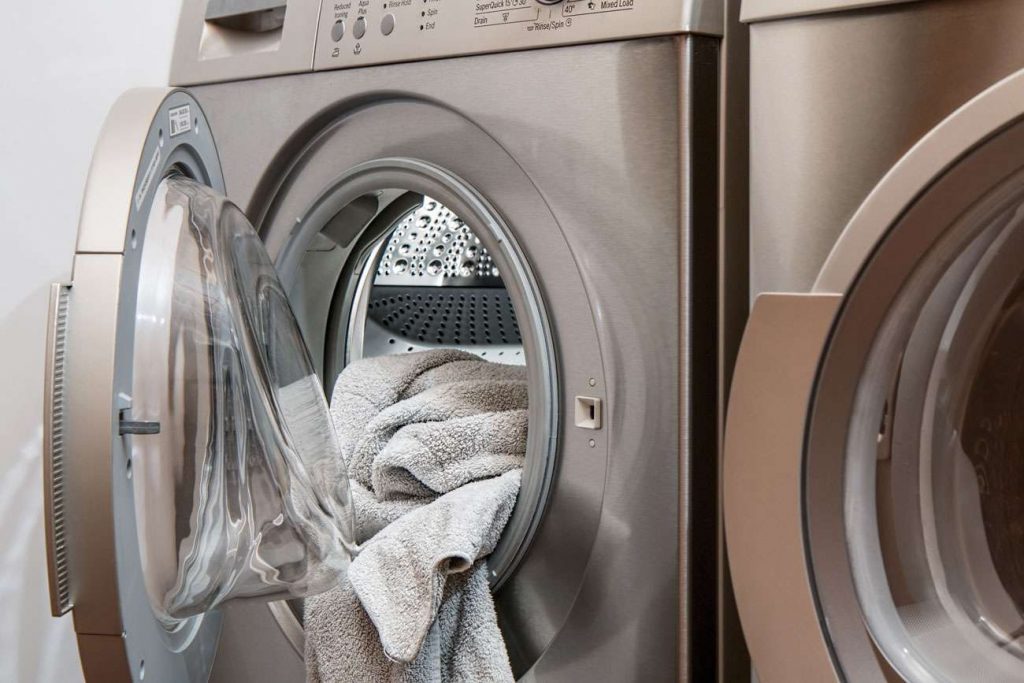
Then last year, it must have been prophetic, I felt that I finally had the space to do more again. I set up two pages on Facebook: one is called Cranleigh Plant Share so the members give away plants, pots, garden equipment, we have an official seed store and even offer physical help – all for free. Plus we also share advice and so on. I also set up a page on how to become greener, more environmentally aware and most importantly advice on lowering your carbon footprint (www.facebook.com/howtoliveagreenerlife) I seem to be lucky in that I’m good at getting information across in a way that people can understand, so I also decided to start re-running the workshops I’d originally run 13 years ago. The bottom line is trying to convey that every single thing we buy has a carbon footprint and so we need to use a lot less and recycle much more responsibly.
People have been very engaged in trying to reduce the amount of plastic they use, but I worry that some people aren’t recognising the priority should be reducing their carbon footprint. Yes, it’s really important to cut our plastic consumption but if you buy less processed, packaged stuff in the first place, you will create less waste automatically (I generally don’t need to put out my recycling bin at all for about four months and haven’t needed to visit any recycling centre or tip for over five years and even that was because I was helping to clear out somebody’s home after they’d died). The old 70s motto REDUCE, REUSE, RECYCLE is what we need to focus on; the most important being REDUCE.
My latest action though came through a staff member at Friends of the Earth (I’ve been a member and of The Woodland Trust for over a decade) and he suggested I train to be a U.N. Accredited Climate Change Teacher, so despite my years of living the way that I do, I’m also now learning about the science. It’s challenging but I’m about two thirds of the way through now and I’m really enjoying it – it’s joining more dots for me, although some of the facts are hard to stomach.

All my garden furniture is second hand
What should people be doing to help reduce their carbon footprint?
Well, it’s really about living a much simpler life, and using less in the first place; expecting less. I think one of the main things about making any change is to think why you would feel motivated to do so, but to answer your question:
- If you haven’t already done so, the first thing is to complete an online carbon footprint calculator to give you an idea of which parts of your lifestyle you need to concentrate on.
- The biggest thing you can do as an individual/family to limit climate change is change your diet – 1/3 of greenhouse gas emissions are as a result of the meat and dairy industry. Too many people are eating way too much meat and this is unsustainable (in terms of the amount of land used, deforestation – which emits masses of carbon dioxide, slurry damaging rivers, lakes and oceans and more – quite apart from the animal welfare issues). Most of the beef eaten in this country actually comes from the Amazon which is being cleared at the rate of three football pitches every minute. As trees store carbon dioxide, losing this amount of trees just to graze cattle and the food they need (which in turn is decimating biodiversity) whilst half of the world starves, makes no sense. The best solution honestly is to give up meat completely, but if you really can’t cope with that at the moment, then eat it once a week but avoid beef and lamb because these animals are ruminants and emit vast amounts of methane into the atmosphere (methane is another greenhouse gas, but it has 20-30 times more heating effect on the planet than carbon dioxide – and pasture fed animals actually cause more damage, not less). If you have to eat beef, then only eat it about once a month and buy organic, locally reared meat. An interesting fact if you class yourself as a flexitarian (somebody who already eats a lot less meat) but you drink plant milks, is that you will have a lower carbon footprint than somebody who is a vegetarian but eats and drinks dairy.
- Reducing flights. If you understand that one seat (yes, one seat) on a return flight to New York will use up as much carbon dioxide as the average person heating their home all year, it gives you some perspective! As such, reducing your flights down to a minimum is important, especially as the aviation industry is exempt from many of the carbon emission restrictions that other industries are bound by because there is as yet no substitute for jet engine fuel – and remember that “carbon offsetting” does nothing to restrict demand – which is currently still rising.
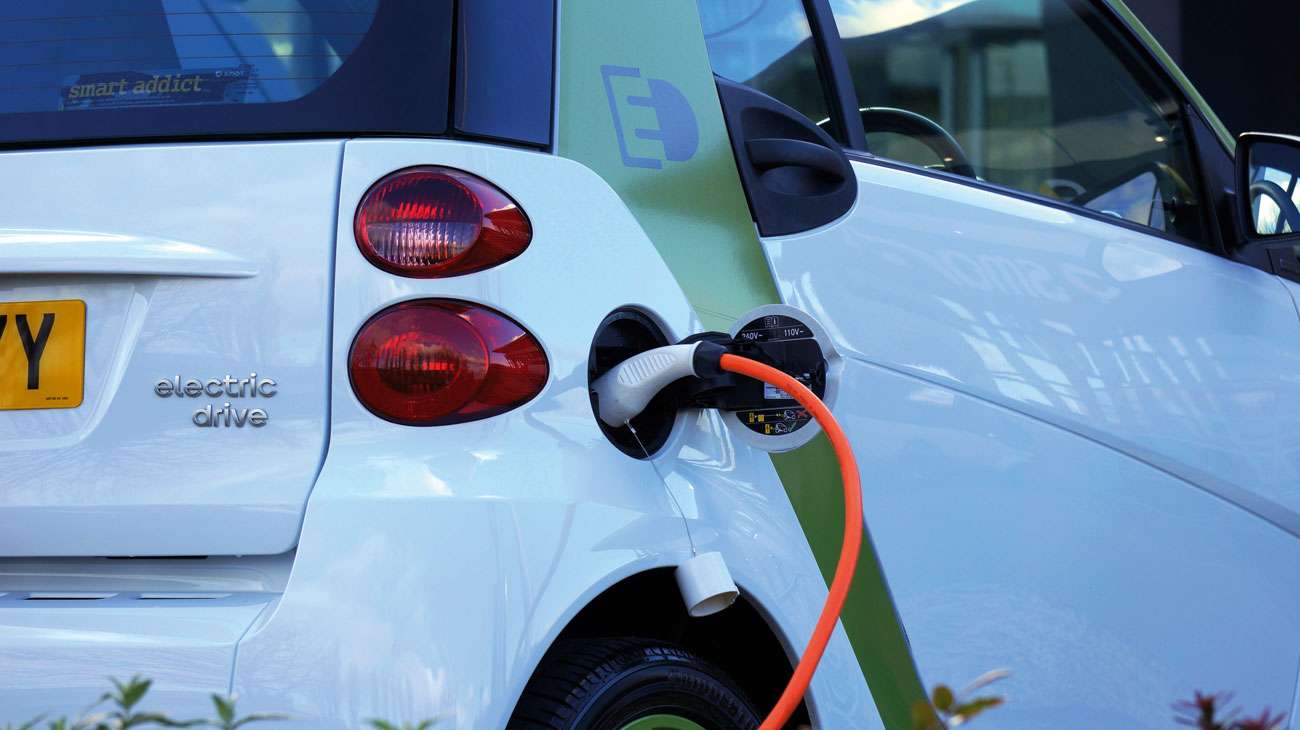
Electric cars are the way ahead
- Think about your domestic energy. If you’re lucky enough to be able to afford solar panels, heat exchangers etc. you’re doing really well but the majority aren’t able to afford these yet. What you can do, however, is switch to a green energy provider (over 35% of our electricity is already now coming from renewables) as it gives a strong message that you, the consumer, wants this which encourages more investment into renewable energy. If your house has got cavity walls, get them insulated, make sure your windows are up to scratch and that your loft is well insulated. In addition, don’t waste energy: turn off the heating when you don’t need it and use a lower setting when you do, only turn the hot water on when you need it. Don’t have too many showers or keep the shower on for too long – people are apparently having more and longer showers than they used to which is using more water than an average bath and of course power showers in particular use a lot of water. Don’t use a tumble drier (one drier load uses 5 times more electricity than washing, that’s the same as turning on 225 lightbulbs for an hour – and you can save 1/3 off your carbon footprint) – use your washing line instead or dry clothes on radiators or airers, don’t leave appliances on, turn lights off when you leave rooms and switch to LED lightbulbs (even switching one will save you £12 a year), Don’t use leaf blowers, patio heaters and other appliances that we can all really do without. Use a manual lawnmower if you have a small – medium sized garden – it’s all common sense really.
- Consider the size of your car engine. If you’re lucky enough to be able to afford an electric car then you’re laughing, but the rest of us are still driving around in petrol or diesel cars. It’s important to understand that large, heavy vehicles have a higher carbon footprint as they generally have bigger engines and use more fuel, ergo they’re not good for the planet. It’s also better to buy second hand so that you’re not creating more demand for mined metals (and second hand vehicles inevitably have a lower carbon footprint). Ideally, buy a smaller car with the smallest engine size you can. Make it fashionable to have smaller cars again! It’s weird that at a time when most of us have smaller families, we’re driving around in huge cars. Drive less, car-share, walk, cycle or take the bus when you can.
- Embrace second hand instead of automatically buying new stuff. We’re blessed now with the likes of Facebook Marketplace, ebay, Freecycle etc. We can get rid of things we don’t want and make lots of money too (last year I made £900.00 from selling stuff I no longer wanted/needed). As I’ve mentioned above, I’ve been upcycling furniture and clothes since the 1970s; it’s so much cheaper and fun than just going out and buying new stuff all the time, half of which you really don’t need. If you do need to buy new, again buy better quality but ensure furniture has the FSC accreditation so that it’s from sustainable sources.
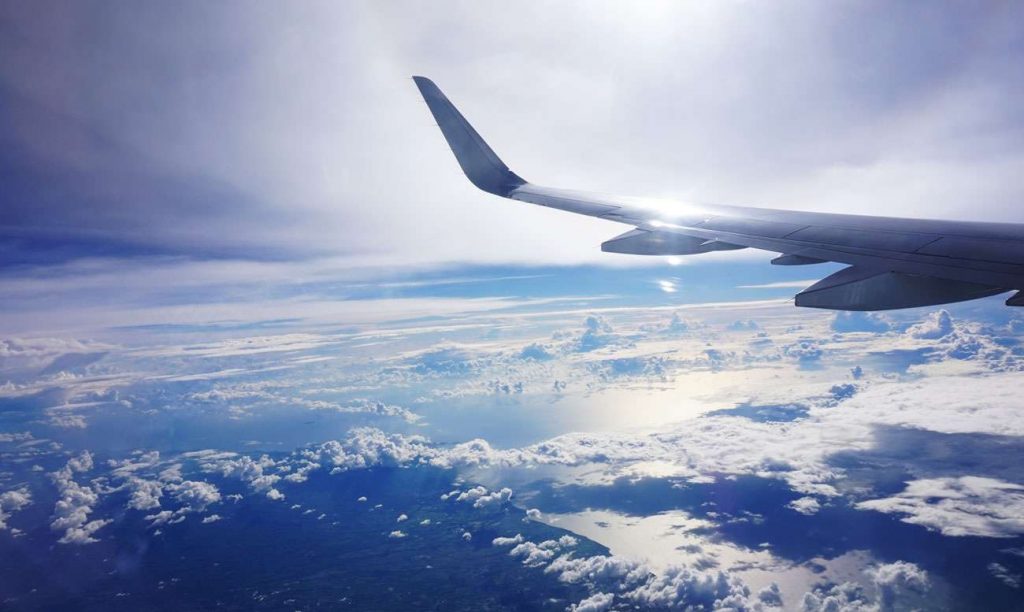
- Plant a garden or window box. We all know plants absorb carbon dioxide –so plant some bee-friendly flowers, a few trees, or a vegetable garden. Creating more spaces for plants, grasses, and trees can help in a small way to fight climate change. Plant trees for shade, or maybe try a green roof or community garden.
- Whenever possible, try to eat local, in-season produce. Sticking to foods that are in season and grown locally helps to reduce your carbon footprint and of course food in season is cheaper and hasn’t been shipped half way across the world. Don’t forget to avoid processed foods: processed and packaged foods are often bad for your health, not just the environment. Ideally choose organic (because our soils are depleted from years of pesticides), whole foods that are better for the planet, and better for your own longevity.
- Be more aware! Read labels and educate yourself about the sorts of things to avoid when you’re shopping. We have more access to information than ever before, there are even apps you can download onto your phone to help you find out if items are eco-friendly or not.
Anyone can make these changes if they have the will to do so and they are immediately effective in reducing your carbon footprint. Our collective actions and choices make a huge difference, as markets respond to us.
Sharon Duggan, January 2020
For more information contact Sharon Duggan Singer, singing teacher, vocal & performance coach, choral director, artist manager here: info@sharonduggan.co.uk
www.facebook.com/howtoliveagreenerlife
www.sharonduggan.co.uk
www.cranleighcommunitychoir.co.uk
www.facebook.com/sharonduggansingingteacher
www.facebook.com/cranleighcommunitychoir



